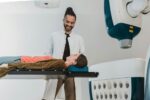
Table of Contents
Every year, 50,000+ people apply for a limited number of medical residency spots. A vital piece of the residency application journey is the residency interview. In this article, we’ve got some expert interview tips for you to increase your odds of success and decrease your levels of stress.
Interview season doesn’t have to be stressful. Yes, how you answer even basic questions can significantly shift your career path, but you’re already more prepared than other candidates just by reading this guide.
In the 2024 NRMP Program Directors Survey, 87% of program directors (PDs) surveyed cited the “interactions with faculty during the interview and visit” as a major factor when ranking applicants. It was second only to interpersonal skills, which are mainly demonstrated on interview day.
Fortunately, many residents report their residency interview to be much lower stress than the medical school interview. Unlike medical school interviews, residency interviews tend to feel more like professional job interviews — a chance to demonstrate readiness rather than potential.
The average student applies to 21-58 residencies and then interviews with 10-15 residency programs before the Match. Here are some tips to make those 10-15 interviews go perfectly so that you have the best chance at going to your dream residency.
Gearing up for residency applications? Download our FREE how-to application guide and increase your odds of matching!
Prepare Before Interview Day
You’ve submitted your application. Ideally, you’ve received several interview invites. Each program may have a unique system to set up residency interviews in October through January, like Thalamus or AAMC’s ERAS, on a “first-come, first-served” basis.
But once you’re signed up, there are many common experiences you can prepare for. Here are the basics on how to be prepared for interview success:
- Research the program website ahead of time: Search for news articles about this residency. Use LinkedIn to study recent residents’ career paths or the program director who is interviewing you. You should know the ins and outs, the mission statement, and even the demographic makeup of previous years of residents. Be prepared to make small talk where you can reference details about the program.
- Do mock interviews: Med school faculty, other students, knowledgeable family or friends, AI chatbots, or online resources like MedSchoolCoach can help you practice interviewing.
- Know your CV cold: Your interviewer might ask about the research, electives, extracurriculars, and clinical experiences listed on your application. Review your resume so you can speak intelligently about your achievements. You don’t want to draw a blank, especially when answering questions about your own personal and healthcare journey.
- Prepare for the chosen format: If your interview is virtual, make sure you have the Zoom link handy ahead of time. Make sure your video conferencing software is up-to-date before the interview starts. If it’s in-person, make a what-to-pack list and ensure you have plenty of time between arriving and the actual interview to look your best. Find affordable lodging that isn’t too far from the interview location.
Looking for common questions to which you can prepare your answers? Click here to skip to the commonly asked interview day questions below.
Our Physician Advisors have helped thousands of med students stand out in their residency interviews. Learn how 1-on-1 interview prep from MedSchoolCoach can help you match into your dream program.
What to Expect From Interview Day
Although every residency program differs, here is a typical in-person interview day schedule:
- Arrive early and introduce yourself professionally and confidently.
- Attend morning reports with current residents.
- 1-3 interviews (more often traditional panel format, instead of MMI) with the program director and admissions officers. Interviews may last 15-60 minutes and be split up by a meal break.
- Lunch break, where you may eat with faculty, doctors, or residents.
- Tour of the facility.
Residency interviews are whole-day affairs, during which you can not only let the program get to know you — you can get to know the program better, too!
In-person or virtual? Residency interviews shifted from in-person to virtual in 2020. Every program is different, but the overwhelming majority of residency programs have since permanently moved interviews to virtual. This levels the playing field for IMGs and students from disadvantaged backgrounds, plus, it’s gentler on the environment to reduce cross-country travel.
Programs with virtual interviews typically try to mimic the traditional “interview day” format, including meet and greets with current residents and a virtual facility tour.
Program types that still strongly favor in-person interviews are generally those with more program years or smaller cohorts, such as surgery and ENT. There is also a trend for programs in more rural areas to return to in-person interview formats.
How programs decide who to interview:
- USMLE scores (more so recently)
- Grades (less so as med schools transition to pass/fail grading systems)
- Letters of recommendation from mentors and professors
- MSPEs
- Personal statement
- Program signals
Learn More: Send a Letter of Intent to Your First Choice Residency
What are the costs associated with residency interviews? The AAMC reports the median cost of in-person residency interviews is $3,000 to cover travel, meals, lodging, and other fees (ranging anywhere from $400 to $7,000).
However, virtual residency interviews are much less expensive and possibly free. All you need is a good-looking suit and an HD webcam, which you may already have before the interview.
How to Stand Out (Besides Grades)
Residency program directors and interviewers will speak to dozens, if not hundreds, of candidates during interview season. You need to stand out, and we’re here to help you make an unforgettable first impression — outside of the stats in your application.
Below are the best non-grade-related tips for distinguishing yourself from the crowd with a stellar first impression:
- Put care into how you dress and look. Dress like a professional, preferably in a suit or pantsuit. Brush your hair. Make sure your breath smells good. For virtual formats, ensure you have a quiet, clean space where you won’t be interrupted (no one wants to see your dirty laundry during an interview).
- Be punctual, as in early. “If you’re on time, you’re late,” as they say.
- Be courteous to everyone. Make sure you’re kind to everybody you interact with on interview day, no matter how small the interaction. Be professional. Try not to be a wallflower. Make it clear that your communication and teamwork skills are superb. Use positive body language with interviewers, faculty, and residents.
- Treat every aspect of the interview day as part of the interview. For instance, all informal meet-and-greets with anyone are part of the evaluation process. Conduct yourself well on tours and in Zoom waiting rooms.
- Confidently introduce yourself. Offer a confident greeting and a firm handshake if you’re in person.
- Demonstrate program knowledge. By taking my earlier advice about researching the residency beforehand, you should be able to make small talk and ask meaningful questions that relate directly to this program’s mission and culture.
- Demonstrate you’re a good fit. Alongside making small talk, brainstorm ways that you would make an excellent asset to this program, both as a resident and as an alum. Show through your answers, questions, and interactions throughout the day that you belong there.
- Sit up straight. Slouching looks lazy, and leaning forward can be perceived as aggressive. Sit comfortably with your back and shoulders straight.
- Don’t fidget. Fidgeting makes you seem nervous and high-strung.
Studies have shown that the first few seconds are critical to a successful interview. By exuding an aura of calm self-confidence through body language, eye contact, and facial expressions, you’ll create a lasting impression of competence and professionalism.
How to Answer Questions Like a Pro
Part of preparing for the residency interview process is practicing how to answer questions with the right mix of confidence, competence, and candor. Here are some tips on preparing to answer questions with confidence:
- Study STAR (Situation, Task, Action, Result): STAR is a structured way to answer behavioral questions. Describe the situation you were in, the task you were given, the action you took, and the result you got.
- Without being arrogant, be confident: This is no time to be modest and self-deprecating.
- Show, don’t tell — when possible: Showing (e.g., using narratives, anecdotes, and examples) is the most memorable way to answer questions. Telling, in which you just answer a question with dry facts, can be forgettable and, at worst, a bit annoying.
- Pause to collect your thoughts, if necessary: A good answer after a pause is generally superior to an immediate, meandering answer filled with um’s. Don’t be afraid to say, “Let me think about that for a second,” before answering.
- Have examples ready: Whether from your time in medical school, relevant clinical practice, impactful patient care anecdotes, or extracurricular experiences, be prepared to discuss when you were a leader or had to practice teamwork.
- Prepare questions to ask the interviewer in advance: Try to tie in something you know about the program, such as research you’re interested in, with your own experience.
- Demonstrate your professional, concise candor in the way you answer: This confident way of answering may showcase your fit for the program.
- Don’t stop at a short answer when discussing your strengths: Most applicants will nervously volunteer a lame response. “I have excellent communication skills,” is a common, forgettable answer. Answer comprehensively in a way that paints a clear, unforgettable picture.
- Be honest and open about your own weaknesses or challenges: Open up about where you may have made missteps or where you’re in the process of pursuing personal growth. But be sure to demonstrate how you’re growing and making changes.
- Use storytelling to help give color, context, and memorability to your answer: You may be able to call on life experiences. Incorporating multiple languages, negotiation tactics learned growing up in a large family, and any accomplishments you’ve earned in and out of school into your storytelling might give you an edge.
Above all, be honest, forthright, and friendly. If you stumble at first, take a deep breath, recover your composure, and then dazzle them with knowledge and charm. You’ve spent years working up to this moment, and it’s your time to shine and stand out.
Common Questions You May Get Asked
Many residency interviews will use similar questions, and it’s smart for you to prepare some answers. I found my sub-internships in medicine to be great sources of answers for behavioral questions, as these rotations were where I was most integrated into team dynamics.
Common residency questions include:
- “Tell me about yourself.” While not a question, it’s the most common “inquiry” you’ll get. Interviewers want to hear about you in a way that isn’t on your ERAS application. Stay modest but honestly and confidently describe your strengths, hobbies, and background.
- “Why this program?” Do your research beforehand. First of all, be honest, unless you applied here for a highly superficial reason. Secondly, demonstrate that you know details about this program and that you really feel that you’d be a good fit.
- “Why did you choose this specialty?” Programs want to hear about what inspired or motivated you to follow this career path. Don’t say, “Money.” Do talk about mentors, impactful experiences, or future goals.
- “What’s a time you met a challenge? How did you respond?” Though the details are different, every interview has this type of question. The panel is looking to see how you solve problems, what your communication style is like, and in what ways you’ve grown or are growing as a future physician.
For more, the American College of Physicians (ACP) has compiled a list of questions most commonly asked in medical residency interviews. AAMC also has a list of residency interview questions. Plus, we have a great guide to common residency interview questions and answers.
Questions You Can Ask Residents and Faculty
Every interview panel will ask, “Do you have any questions for us?” Here are some specific questions you can ask them that will help you stand out as an applicant:
- If I’m invited to be an intern here, what would a successful first year look like to you?
- Are there any elements of program culture I didn’t get to experience today?
- In what ways does the program support resident wellness?
- How important is mentorship to your program?
- Would you say your faculty members have any unique teaching methods?
- Are there any research opportunities through this program that we haven’t talked about?
- Tell me about [an interesting detail you found on their website].
- Where’s the nearest coffee place? (If you’re looking to make them smile.)
You could save a couple of questions for residents as you more casually speak to current residents throughout the day. For instance, “What’s something you wish you knew before interning here?” Or, “What’s the work-life balance here, really?”
Just pick a few questions that you feel are authentic. Don’t just parrot every question you read on a list.
Learn More: How To Create Your Residency Match Rank List
After the Interview: Next Steps
Once you complete your interview, immediately document all your impressions: what you liked, didn’t like, and what stuck out. Note the culture, values, opportunities, and anything else you noticed.
This documentation helps you arrange your rank order list before Match Week. In a few months, you may not remember the pros and cons of every single program.
Also, it’s good to review your own performance so that you can improve with each interview.
Read Next: Average Medical Resident Salary
Immediately after your interview, send thank-you notes to the program directors or whoever interviewed you.
Thank-you notes are not just a formality. They demonstrate your professionalism, remind interviewers of your strengths, and may boost your odds of getting an acceptance offer.
Reiterate your interest in the program and mention highlights from your interview day.
Is it appropriate to reach out after my interview with follow-up questions? Yes, you may contact a program with follow-up questions post-interview. It is not appropriate to try to influence their decision, but it is perfectly acceptable to ask clarifying questions — especially if the interviewer gave you their contact info.
FAQs
Below are some red flags to watch out for on your interview day:
- Lack of organization
- Culture mismatch
- Major personality clashes
- If claims made beforehand turn out to be misleading or false
- Inappropriate personal questions that may constitute discrimination
It is crucial to look for these three things when applying to residencies:
- Good alumni outcomes (both professional and personal)
- Culture fit (values, mission, community)
- Opportunities that align with your goals (research, mentorship, personal objectives)
A residency interviewer is totally justified in asking about low USMLE scores since this exam is a vital step in determining whether you get licensed to practice medicine.
USMLE scores are becoming more important to the residency application process and interviews as more and more medical schools move to a pass/fail grading system. A low USMLE Step 2 score may indicate that you’re not ready for residency and might need a gap year.
Also, USMLE Step 1 is now pass/fail, so Step 2 CK scores are carrying more weight than ever.
Ready to Shine in Your Residency Interviews?
Interview preparation and a strong sense of self-confidence can boost your Match Week odds and alleviate interview stress. Part of your prep should be working with MedSchoolCoach experts. 95% of our clients match into one of their top five choices for residency.
You should become much more relaxed as the season plays out and you get a couple of interviews under your belt. It’s a fun and exciting time — remember to enjoy it. Good luck!
All our Physician Advisors have served on a residency admissions committee. Work with one today to hone your interview skills and maximize your chance of matching.

Amar Mandalia, MD
Dr. Mandalia is an accomplished medical writer with multiple manuscripts in peer-reviewed journals and a practicing GI physician in the Orlando area. He is the Admissions Advisor for MedSchoolCoach and has extensive experience helping students get into medical school and residency.





